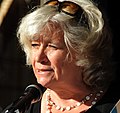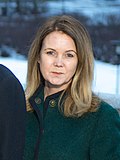| No. | Portrait | Minister | Took office | Left office | Time in office | Party | Cabinet |
|---|
| 1 | | Theodor Odelsberg
(1847–1938) | 31 March 1900 | 2 August 1905 | 5 years, 124 days | Moderate | Boström I
von Otter
Boström II
Ramstedt |
| 2 | | Alfred Petersson
(1860–1920) | 2 August 1905 | 7 November 1905 | 97 days | Electoral League | Lundeberg |
| 3 | | Gösta Tamm
(1866–1931) | 7 November 1905 | 29 May 1906 | 203 days | Free-minded | Staaff I |
| (2) | | Alfred Petersson
(1860–1920) | 29 May 1906 | 17 March 1909 | 2 years, 292 days | Electoral League | Lindman I |
| 4 | | Oscar Nylander
(1853–1920) | 17 March 1909 | 7 October 1911 | 2 years, 204 days | Electoral League | Lindman I |
| (2) | | Alfred Petersson
(1860–1920) | 7 October 1911 | 17 February 1914 | 2 years, 133 days | Free-minded | Staaff II |
| 5 | | Johan Beck-Friis
(1862–1929) | 17 February 1914 | 30 March 1917 | 3 years, 41 days | Independent | Hammarskjöld |
| 6 | | Knut Dahlberg
(1877–1949) | 30 March 1917 | 19 October 1917 | 203 days | Electoral League | Swartz |
| (2) | | Alfred Petersson
(1860–1920) | 19 October 1917 | 10 March 1920 | 2 years, 143 days | Free-minded | Edén |
| 7 | | Olof Nilsson
(1863–1928) | 10 March 1920 | 27 October 1920 | 231 days | Social Democrats | Branting I |
| 8 | | Nils Hansson
(1867–1945) | 27 October 1920 | 13 October 1921 | 351 days | Independent | De Geer
von Sydow |
| 9 | | Sven Linders
(1873–1932) | 13 October 1921 | 19 April 1923 | 1 year, 188 days | Social Democrats | Branting II |
| 10 | | David Pettersson
(1866–1957) | 19 April 1923 | 18 October 1924 | 1 year, 182 days | Electoral League | Trygger |
| (9) | | Sven Linders
(1873–1932) | 18 October 1924 | 7 June 1926 | 1 year, 232 days | Social Democrats | Branting III
Sandler |
| 11 | | Paul Hellström
(1866–1927) | 7 June 1926 | 3 July 1927 | 1 year, 26 days | Free-minded | Ekman I |
| 12 | | Bo von Stockenström
(1887–1962) | 12 July 1927 | 2 October 1928 | 1 year, 82 days | Free-minded | Ekman I |
| 13 | | Johan Bernhard Johansson
(1877–1949) | 2 October 1928 | 7 June 1930 | 1 year, 248 days | Electoral League | Lindman II |
| (12) | | Bo von Stockenström
(1887–1962) | 7 June 1930 | 24 September 1932 | 2 years, 109 days | Free-minded | Ekman II
Hamrin |
| 14 | | Per Edvin Sköld
(1891–1972) | 24 September 1932 | 19 June 1936 | 3 years, 269 days | Social Democrats | Hansson I |
| 15 | | Axel Pehrsson-Bramstorp
(1883–1954) | 19 June 1936 | 31 July 1945 | 9 years, 42 days | Centre | Pehrsson-Bramstorp
Hansson II
Hansson III |
| (14) | | Per Edvin Sköld
(1891–1972) | 31 July 1945 | 29 October 1948 | 3 years, 90 days | Social Democrats | Hansson IV
Erlander I |
| 16 | | Gunnar Sträng
(1906–1992) | 29 October 1948 | 1 October 1951 | 2 years, 337 days | Social Democrats | Erlander I |
| 17 | | Sam B. Norup
(1896–1973) | 1 October 1951 | 1 February 1957 | 5 years, 123 days | Centre | Erlander II |
| 18 | | Bernhard Näsgård
(1891–1957) | 1 February 1957 | 8 July 1957 | 157 days | Centre | Erlander II |
| 19 | | Nils G. Hansson
(1902–1981) | 29 July 1957 | 31 October 1957 | 94 days | Centre | Erlander II |
| 20 | | Gösta Netzén
(1908–1984) | 31 October 1957 | 24 November 1961 | 4 years, 24 days | Social Democrats | Erlander III |
| 21 | | Eric Holmquist
(1917–2009) | 24 November 1961 | 24 January 1969 | 7 years, 61 days | Social Democrats | Erlander III |
| 22 | | Ingemund Bengtsson
(1919–2000) | 25 January 1969 | 3 November 1973 | 4 years, 282 days | Social Democrats | Erlander III
Palme I |
| 23 | | Svante Lundkvist
(1919–1991) | 3 November 1973 | 8 October 1976 | 2 years, 340 days | Social Democrats | Palme I |
| 24 | | Anders Dahlgren
(1925–1986) | 8 October 1976 | 18 October 1978 | 2 years, 10 days | Centre | Fälldin I |
| 25 | | Eric Enlund
(1918–2011) | 18 October 1978 | 12 October 1979 | 359 days | Liberals | Ullsten |
| (24) | | Anders Dahlgren
(1925–1986) | 12 October 1979 | 4 October 1982 | 2 years, 357 days | Centre | Fälldin II
Fälldin III |
| – | | Claes Elmstedt
(1928–2018)
Acting | 4 October 1982 | 8 October 1982 | 4 days | Centre | Fälldin III |
| (23) | | Svante Lundkvist
(1919–1991) | 8 October 1982 | 10 October 1986 | 4 years, 2 days | Social Democrats | Palme II
Carlsson I |
| 26 | | Mats Hellström
(born 1942) | 10 October 1986 | 4 October 1991 | 4 years, 359 days | Social Democrats | Carlsson I
Carlsson II |
| 27 | | Karl Erik Olsson
(1938–2021) | 4 October 1991 | 7 October 1994 | 3 years, 3 days | Centre | Bildt |
| 28 | | Margareta Winberg
(born 1947) | 7 October 1994 | 22 March 1996 | 1 year, 167 days | Social Democrats | Carlsson III |
| 29 | | Annika Åhnberg
(1949–2025) | 22 March 1996 | 7 October 1998 | 2 years, 199 days | Social Democrats | Persson |
| (28) | | Margareta Winberg
(born 1947) | 7 October 1998 | 21 October 2002 | 4 years, 14 days | Social Democrats | Persson |
| 30 | | Ann-Christin Nykvist
(born 1948) | 21 October 2002 | 6 October 2006 | 3 years, 350 days | Social Democrats | Persson |
| 31 | | Eskil Erlandsson
(born 1957) | 6 October 2006 | 5 October 2010 | 3 years, 364 days | Centre | Reinfeldt |
























